[ 9/11 Books Page 2 ] [ Post-9/11 Books ] [ Post-9/11 Books 2 ]
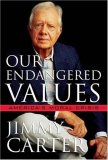 |
Our Endangered Values: America's Moral CrisisBy Jimmy Carter |
|
In Our Endangered Values, Jimmy Carter describes quite personally his own involvement and reactions to some disturbing societal trends that have taken place during the past few years. These changes involve both the religious and the political worlds as they have increasingly become intertwined, and include some of the most crucial and controversial issues of the day - frequently encapsulated under 'moral values'. |
|
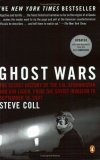 |
Ghost Wars: The Secret History of the CIA, Afghanistan, and Bin Laden, from the Soviet InvasionBy Steve Coll |
|
Steve Coll's Ghost Wars: The Secret History of the CIA, Afghanistan, and Bin Laden, from the Soviet Invasion to September 10, 2001 offers revealing details of the CIA's involvement in the evolution of the Taliban and Al Qaeda in the years before the September 11 attacks. From the beginning, Coll shows how the CIA's on-again, off-again engagement with Afghanistan after the end of the Soviet war left officials at Langley with inadequate resources and intelligence to appreciate the emerging power of the Taliban. He also demonstrates how Afghanistan became a deadly playing field for international politics where Soviet, Pakistani, and U.S. agents armed and trained a succession of warring factions. At the same time, the book, though opinionated, is not solely a critique of the agency. Coll balances accounts of CIA failures with the success stories, like the capture of Mir Amal Kasi. Coll, managing editor for the Washington Post, covered Afghanistan from 1989 to 1992. He demonstrates unprecedented access to records of White House meetings and to formerly classified material, and his command of Saudi, Pakistani, and Afghani politics is impressive. He also provides a seeming insider's perspective on personalities like George Tenet, William Casey, and anti-terrorism czar, Richard Clarke ("who seemed to wield enormous power precisely because hardly anyone knew who he was or what exactly he did for a living"). |
|
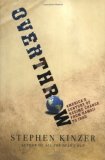 |
Overthrow: America's Century of Regime Change from Hawaii to IraqBy Stephen Kinzer |
|
The recent ouster of Saddam Hussein may have turned "regime change" into a contemporary buzzword, but it's been a tactic of American foreign policy for more than 110 years. Beginning with the ouster of Hawaii's monarchy in 1893, Kinzer runs through the foreign governments the U.S. has had a hand in toppling, some of which he has written about at length before (in All the Shah's Men, etc.). Recent invasions of countries such as Grenada and Panama may be more familiar to readers than earlier interventions in Iran and Nicaragua, but Kinzer, a foreign correspondent for the New York Times, brings a rich narrative immediacy to all of his stories. Although some of his assertions overreach themselves—as when he proposes that better conduct by the American government in the Spanish-American War might have prevented the rise of Castro a half-century later—he makes a persuasive case that U.S. intervention destabilizes world politics and often leaves countries worse off than they were before. Kinzer's argument isn't new, but it's delivered in unusually moderate tones, which may earn him an audience larger than the usual crew of die-hard leftists. |
|
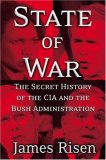 |
State of War: The Secret History of the C.I.A. and the Bush AdministrationBy James Risen |
|
The winter holidays are usually a quiet time for news, but the December 2005 revelations of the Bush administration's extensive, off-the-books domestic spying program by New York Times reporters James Risen and Eric Lichtblau made headline after headline, raising criticism from both sides of the aisle and an immediate, unapologetic response from President Bush himself. On the heels of those scoops comes Risen's State of War, which goes beyond his Times stories to provide a wide-ranging, if anecdotal, "secret history" of U.S. intelligence following 9/11. |
|
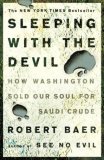 |
Sleeping with the Devil: How Washington Sold Our Soul for Saudi CrudeBy Robert Baer |
|
According to Robert Baer, the center of the global economy is a "kingdom built on thievery, one that nurtures terrorism, destroys any possibility of a middle class based on property rights, and promotes slavery and prostitution." This kingdom also sits on one quarter of the world's oil reserves, thus ensuring that it receives the full support and protection of the U.S. government. Sleeping With the Devil details the hypocritical and corrupt relationship between the U.S. and Saudi Arabia and the potentially calamitous economic consequences of maintaining this Faustian bargain. |
|
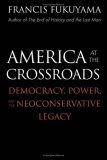 |
America at the Crossroads: Democracy, Power, and the Neoconservative LegacyBy Francis Fukuyama |
|
In this history of and forecast for neoconservative thought, Fukuyama (The End of History and the Last Man), a neoconservative with close ties to the Bush administration, complicates the notion that many of the Bush administration's policies are based on neoconservative thought by tracing the roots of neoconservativism from the 1940s onward. Fukuyama finds fault with many aspects of Bush's foreign policies, notably the inadequate planning for post-conflict reconstruction in Iraq, the conflation of the threat of radical Islamism with Iraq and the administration's non-cooperation with international organizations like the United Nations during a deluge of anti-Americanism. Unlike many indictments of the Bush administration, Fukuyama's book considers conflicting neoconservative principles and offers a reconciliation of neoconservative thought with a wider worldview, making this a timely book that'll spur more than its share of discussion. |
|
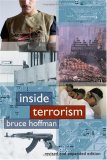 |
Inside TerrorismBy Bruce Hoffman |
|
The word "terrorism" first became popular during the French Revolution, when the régime de la terreur was initially viewed as a positive political system that used fear to remind citizens of the necessity of virtue. The use of violence to "educate" people about ideological issues has continued, but it has taken on decidedly negative connotations--and has become predominantly, though not exclusively, a tactic deployed by those who do not have the powers of state at their disposal. |
|
 |
Beyond Chutzpah: On the Misuse of Anti-Semitism and the Abuse of HistoryBy Norman G. Finkelstein |
|
Finkelstein, a political science professor and author of The Holocaust Industry: Reflections on the Exploitation of Jewish Suffering, has conducted a rancorous public feud with Harvard Law professor and pro-Israel stalwart Alan Dershowitz over the latter's The Case for Israel, and here expands his arguments into a vigorous polemic on the Israeli-Palestinian conflict. The first part of the book examines what he feels is a growing tendency of pro-Israel commentators to use spurious charges of anti-Semitism to deflect and discredit legitimate criticism of Israel. The second, much longer, part is a line-by-line debunking of The Case for Israel, which he compares to Communist apologetics for Stalinist Russia. Rebutting Dershowitz's claims about Israel's "superb" human rights record, Finkelstein cites human rights organizations like Amnesty International, Human Rights Watch and the Israeli group B'Tselem to document Israeli abuses in the occupied territories, including killings of Palestinian civilians, torture of Palestinian prisoners and home demolitions. Lengthy appendices flesh out his explosive assertion that Dershowitz plagiarized the historical research and interpretations (but not the actual phrasing) of Joan Peters's From Time Immemorial. The Middle East conflict rarely inspires calm discussion, and Finkelstein duly pillories his opponents as perpetrators of "hoax" and "fraud" who lack "ordinary moral values" and whose behavior resembles anti-Semitic stereotypes. Inflammatory rhetoric aside, he does raise serious questions about the veracity, scholarly methods and fairness of Dershowitz and others. |